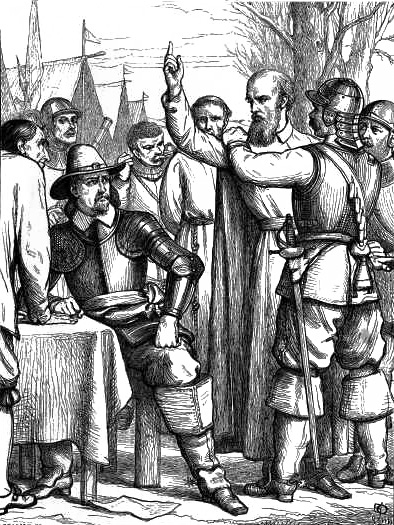Ireton besieges Limerick
It will be remembered that Cromwell had passed by Limerick at a respectful distance; but the possession of that city was none the less coveted. Ireton now prepared to lay siege to it. To effect this, Coote made a feint of attacking Sligo; and when he had drawn off Clanrickarde's forces to oppose him, marched back hastily, and took Athlone. By securing this fortress he opened a road into Connaught; and Ireton, at the same time, forced the passage of the river at O'Briensbridge, and thus was enabled to invest Limerick.

Ireton condemning the Bishop of Limerick
Lord Muskerry marched to its relief; but he was intercepted by Lord Broghill, and his men were routed with great slaughter. The castle at the salmon weir was first attacked; and the men who defended it were butchered in cold blood, although they had surrendered on a promise of quarter. At length treachery accomplished what valour might have prevented. The plague was raging in the city, and many tried to escape; but were either beaten back into the town, or killed on the spot by Ireton's troopers. The corporation and magistrates were in favour of a capitulation; but the gallant Governor, Hugh O'Neill, opposed it earnestly. Colonel Fennell, who had already betrayed the pass at Killaloe, completed his perfidy by seizing St. John's Gate and Tower, and admitting Ireton's men by night. On the following day the invader was able to dictate his own terms. 2,500 soldiers laid down their arms in St. Mary's Church, and marched out of the city, many dropping dead on their road of the fearful pestilence. Twenty-four persons were exempted from quarter.
Amongst the number were a Dominican prelate, Dr. Terence O'Brien, Bishop of Emly, and a Franciscan, Father Wolfe. Ireton had special vengeance for the former, who had long encouraged the people to fight for their country and their faith, and had refused a large bribe [3] which the Cromwellian General had offered him if he would leave the city. The ecclesiastics were soon condemned; but, ere the Bishop was dragged to the gibbet, he turned to the dark and cruel man who had sacrificed so many lives, and poured such torrents of blood over the land, summoning him, in stern and prophetic tones, to answer at God's judgment-seat for the evils he had done. The Bishop and his companion were martyred on the Eve of All Saints, October 31st, 1651. On the 26th of November Ireton was a corpse. He caught the plague eight days after he had been summoned to the tribunal of eternal justice; and he died raving wildly of the men whom he had murdered, and accusing everyone but himself of the crime he had committed.
Several of the leading gentry of Limerick were also executed; and the traitor Fennell met the reward of his treachery, and was also hanged. Hugh O'Neill was saved through the remonstrances of some of the Parliamentary officers, who had the spirit to appreciate his valour and his honorable dealing.
Notes
[3] Bribe.—40,000 golden crowns, and free leave to emigrate where he chose.—Hib. Dom. p. 448.
